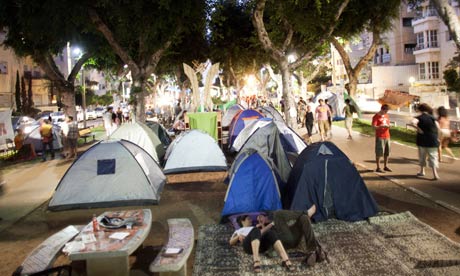NOVANEWS
Anger over rising prices is fuelling ‘Israeli Summer’ and generating widespread support for action.

A tent camp in Tel Aviv: the protests over high rents and house prices have the support of 87% of the population, according to a poll. Photograph: Uriel Sinai/Getty Images
Israel‘s tent city protests over housing are growing by the day, and the mood of civil activism is spreading to other issues. The voices saying this is a serious crisis for Binyamin Netanyahu and his government are getting louder.
I visited a protesters in Jerusalem a week ago, and two days later I was in Rothschild Boulevard in Tel Aviv, where the protests began and which is the biggest of the tent cities which have now spread to at least 25 towns. It was an impressive sight – literally hundreds of pop-up tents stretching the length of the city’s most affluent street, populated by mostly young people. There are debating areas, kitchens for creating huge communal meals, musical performances, poetry readings, TV screens – and genuine anger over the price of housing.
Last night, the popular revolt against the cost of living focussed on a new issue: the price of bringing up a child in Israel. Thousands of parents marched with young children in pushchairs, demanding lower prices and tax breaks on baby equipments and childcare.
Less than a week ago, tens of thousands of people rallied in Tel Aviv in support of the housing protest. Dozens of key roads and junctions have been blocked by protesters, and the entrance to the Knesset (Israeli parliament) has been blockaded.
The Histradut, Israel’s trade union federation, has threatened to join the action next week. It will “use all the measures at its disposal,” said leader Ofer Eini. Doctors are on strike over pay and conditions. A Facebook campaign has called on Israeli citizens to “boycott” their jobs on Monday in an unofficial, social media-organised general strike.
Demonstrations have been called in six Israeli cities for this Saturday evening – Tel Aviv, Jerusalem, Haifa, Ashdod, Beer Sheva and Nazareth. The last is an Israeli-Arab town; tent protest villages have appeared in Arab areas of the country in the past few days.
Although the main focus is on the cost of housing – Tel Aviv rents are generally reckoned to absorb about 50% of income – there is also anger about the price of food, electricity and fuel as well as baby goods. A consumer boycott of cottage cheese in protest at dairy prices won widespread support.
An Israeli man plays on a flute amid tents in Tel Aviv. Photograph: Oliver Weiken/EPA
Inevitably connections have been made between the Arab Spring and this Israeli Summer. There are of course important differences: the protesters are mostly middle-class; the focus is on the cost of living rather than fundamental rights of freedom and democracy. And the protests are tolerated rather than repressed by the authorities. But there is a palpable hostility in Israel towards the government for its failures to feel the pain of its citizens and to do anything about it. And a poll showed 87% support for the protest. The government has been seriously rattled.
Netanyahu’s emergency housing measures, announced this week, were immediately rebuffed by protesters. Even student leaders, who acknowledged that the concessions offered to them were unprecedented, said they would not give up their protest until the needs of other sectors of society had also been addressed.
The protests have been given enormous – and sympathetic – media coverage here, adding to Netanyahu’s anxieties. An analysis which leads the front page of today’s Haaretz (English edition) begins:
A wartime mood prevailed in the prime minister’s office yesterday. The other shoe dropped. This is a serious, unprecedented, powerful phenomenon. The middle-class rebellion, spreading like wildfire throughout the country, is undoubtedly the most acute crisis the second Netanyahu government has had to deal with.
An editorial in the same (liberal) paper on Thursday said:
Even those who don’t entirely agree with the messages coming out of the protests, marches, hunger strikes and demonstrations blocking traffic can’t ignore the protest’s vigour, in contrast to the apathy and even impassiveness that characeterised the Israeli people in recent years. In the surprising reversal of a process in which sectors of society turned inward, splintering the country and weakening it, the protest has swept up a broad public that has displayed a kind of solidarity and involvement that seemed gone forever.
In Yedioth Ahranoth, Israel’s biggest-selling daily, the respected veteran commentator Nahum Barnea wrote:
The Rothschild Boulevard rebellion is a fascinating phenomenon. It is difficult for me to assess its seriousness, its depth, its life expectancy. It is measured by standards with which I am not familiar, and is part of a different discourse, a different culture, different from the one that characterized previous waves of protest. We are accustomed to gauging waves of protest according to the demands they raise and according to the achievements they win at their end.
The residents of the encampment on Rothschild do not have an orderly list of demands and predetermined exit points. They have nothing, save the authentic feeling that their situation, as young middle class Israelis, is terrible, unfair, crying out for change. Just as they loathe Netanyahu or Steinitz, they loathe the residents of the luxury towers further down the street. This is a non-political, anti-political loathing. The question is still open whether at a certain point it will become a political lever that will turn things around in the state.
And in Ma’ariv, Ben Caspit made a connection between the protests and Netanyahu’s other big headache, the looming Palestinian bid for statehood at the UN in September:
For months he has been preparing for September, been afraid of September, been repressing September and been preparing himself for the worst of all in September. But suddenly, Binyamin Netanyahu has now found himself waiting eagerly for September… If only it were September already, the prime minister says to himself, how wonderful it will be in September with the Palestinians and the Arabs and the UN General Assembly and with the entire world against us, and finally we’ll be able to mark for ourselves a common enemy. How wonderful, because better to have the entire world against us than to have the middle class against me.
In September he won’t have to embrace everyone all the time and utter artificial words of reconciliation; he won’t have to grit his teeth and praise the protest movement; he won’t have to recognize publicly the justice of the position of the people demonstrating against him; he won’t have to hold press conferences and shoot programs from the hip and invent new supertankers. In September everything will be clear. Them and us, Arabs and Jews, the stuff that I already know and can handle excellently. I can hardly wait for September.




